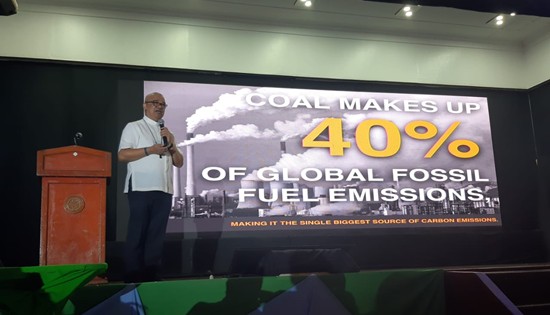San Carlos
bishop: Philippine banks must divest from coal

Press Release
March 1, 2020
CAGAYAN DE ORO –
Representing the Withdraw from Coal Campaign, a Church leader on
Friday appealed to Philippine financial institutions to stop funding
the expansion of coal operations in the country and support the
development of renewable energy instead.
The call was made during
the 3rd Philippine Environment Summit, an event that presents
current initiatives contributing to the country’s social and
economic development while conserving the environment, held on 26-28
February at the Grand Caprice Convention Center in Cagayan de Oro.
“As fulfillment of their
moral obligation, Philippine banks must have concrete plans to phase
out coal finance in the time required by today’s climate crisis.
They must have clear policies restricting their exposure to coal,
channeling the funds they divest from it into clean and affordable
renewable energy for all Filipinos,” said Bishop Gerardo Alminaza of
the Diocese of San Carlos, Negros Occidental.
While praising the SONA
2019 directive of President Rodrigo Duterte to “fast-track” the
development of renewable energy resources and reduce dependency on
coal, the bishop pointed out that the continuing dominance of coal
in the country's energy mix calls for even more ambitious ways
forward from different sectors, including the finance industry.
“Banks financing coal are
not only funding the climate crisis, they are also enabling the
continued suffering of coal-affected communities,” he stressed.
In addition to the 16 new
coal-fired power plants added to the national fleet in the last
decade, the Philippines is still looking to add a total of 12,014 MW
of new coal power, making it the ninth biggest coal expansionist in
the world as of 2019.
13 local banks had been
identified to have loaned or underwritten USD 6.303 billion to coal
interests from 2017 to the third quarter of 2019. Two of these
banks, Bank of the Philippine Islands (BPI) and Banco de Oro (BDO)
account for nearly 55% of this finance.
“The IPCC reported that
the world has until 2030 to reduce coal use by 78% from 2010 levels
to avoid even more disastrous climate impacts. As stewards of
Creation, we must unite with our scientists on this and seek to veer
away from a fuel that causes the suffering of our people and
destruction of our Common Home,” Alminaza said.
Alminaza stated that as
the Philippines is one of the most vulnerable nations to climate
change, it must lead in phasing out coal, and financial institutions
must take their role in it seriously – similar to the commitment of
the Catholic Bishops Conference of the Philippines (CBCP) and his
own diocese to divesting its resources from dirty energy
technologies.
A petition letter
addressed to the Bank of the Philippine Islands, the bank with which
many Church organizations have financial relations, was also
circulated during the event and was signed by hundreds of
participants, including Bishop Antonio Ledesma of Cagayan De Oro.
“We appeal to all to join
the calls as written in our letter as expression of our care for our
common home and our future generations. For as one saying goes, ‘we
do not inherit the Earth from our ancestors – we borrow it from our
children.’ We must act swiftly for time is running out,” said
Alminaza.
Launched in Manila in
January and in Visayas in February, "Withdraw from Coal" is a
campaign spearheaded by the Church, civil society, and people’s
organizations urging Philippine banks to divest from businesses
involved in coal power generation and coal extraction.